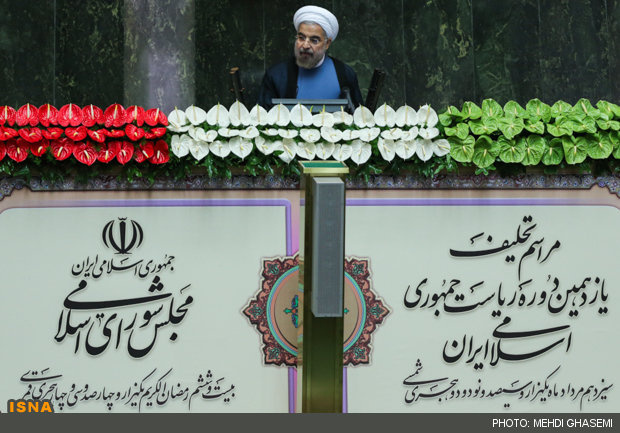Significance of Rohani’s Swearing-in Ceremony and Its Consequences

What is the significance of Dr. Rohani’s swearing-in ceremony considering the level of presence of participating leaders?
First of all, this issue will raise the national prestige of the country. We also intend to show the world that the election of a president is very important for us at the national level. Furthermore, it is very common in the world for foreign officials to be invited to this type of ceremony when a president or a leader changes in a country. This diplomacy has existed for a long time and is nothing new. The fact that we have invited foreign countries for the first time to this ceremony shows our intention to tell the world that, contrary to the efforts made through the imposing of sanctions, we are not politically isolated and more than 60 countries have come to take part in the swearing-in ceremony of Iran’s president.
How would you assess the level of participation of foreign leaders and officials in the swearing-in ceremony of Iran’s new president, Dr. Rohani?
More than 50 delegations have participated in this ceremony at different levels. Those countries closer to us have taken part at the presidential or prime ministerial level and the others at a lower level. It must be said that the level of participating officials in this ceremony depends on the type of relations with different countries of the world.
During recent years, Iran’s relations with the Arab and western countries have been faced with challenges. How would these countries view the new Rohani administration considering the swearing-in ceremony of Iran’s new president?
Many Arab countries have sent congratulatory messages to Iran’s new president. Meanwhile, the recent speeches made by Mr. Rohani can give new color to Iran’s foreign policy following the challenges and crises which were created during Mr. Ahmadinejad’s tenure. In fact, Mr. Rohani’s presence has been more appealing for the Arab countries for these countries are our neighbors and they were concerned about Iran’s political and regional behavior. Furthermore, Rohani’s statements and approaches and his usage of hopeful words with regard to foreign policy have also attracted them. Besides, the European Union is the closest geopolitical position for Iran and I suggest that Mr. Rohani make his first official visit to the European countries, especially Germany or France. Contrary to the US, the EU has pursued a milder policy with regard to Rohani. We can also become closer to the EU and the domestic atmosphere of our country has the capacity to accept France or Germany as two important countries of the EU.
Considering the two present US approaches with regard to Iran, meaning the approach of interaction and reduction of sanctions and pressures and testing Mr. Rohani’s government and the approach of imposing continuous pressure and increasing sanctions, what would the impact of Dr. Rohani’s swearing-in ceremony, as the new president, and the presence of most foreign countries be on the future of the nuclear dossier and the US’ view of Iran?
The Americana have two outlooks with regard to Iran. The Republicans and the radicals’ approach is mainly influenced by the Zionist lobbies, whose spokesperson is Mr. Netanyahu. He has mentioned that Mr. Rohani is a wolf in sheep’s clothing. This type of thinking is in contrast with the view of the Democrats, who are led by Mr. Obama. He believes that Rohani must be given another opportunity to express new behaviors. In fact, those who are against Iran believe that Iran-US relations are not important and even the nuclear issue and human rights are not significant, but that the main problem, from this viewpoint, in Iran-US relations is rather Israel. It means that Iran’s policy and outlook with regard to Israel causes the powerful lobbies in the US to not allow Iran to continue its life merely by solving the nuclear issue.
What would the impacts of the participation of foreign dignitaries in the president’s swearing-in ceremony be on the foreign policy opportunities of Rohani’s government?
The countries that have participated in this ceremony are not internationally significant and are mainly from poor or regional countries. But the fact that we could have such a presence is good. Furthermore, we are gradually enforcing international models in our country which in itself is interesting. Our management on the issue of Syria is a strategic look; therefore, I do not assume that this invitation would change our regional and, at least, our regional macro-policies.
Many leaders from neighboring and regional countries like the presidents of Turkmenistan, Tajikistan, Armenia, Pakistan, Kazakhstan, Afghanistan, and Lebanon and Iraq’s presidential envoy participated in this ceremony. What is the significance of this issue?
Although the regional countries are concerned about Iran becoming more powerful, they take this point into consideration that they should not keep themselves away from Iran in the process of growth of Iran’s power. It means that they do not want to stand against Iran only by relying on the European countries and the US. Therefore, besides sending congratulatory messages for Mr. Rohani, the regional countries participate in this ceremony at the highest level.
Can it be said that the presence of foreign dignitaries in this ceremony is a turning point in Iran’s foreign policy?
Yes, alongside the reduction of pressures on Iran, this issue can prepare the atmosphere in such a way that such an event would happen. This measure shows that the new president has a proper outlook with regard to the foreign countries and attempts to improve the foreign policy of the country through domestic reform. In fact, Iran plays the role of a regional power in this region. We are also moving towards international reconciliation with other countries.

